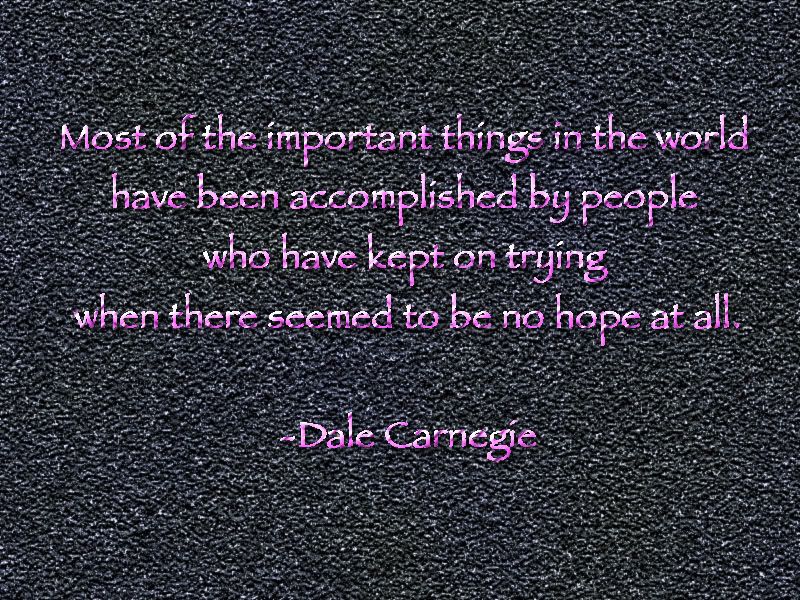
by Keith Varnum -
I cringed at every loaded word in the title of Dale Carnegie’s celebrated book, How to Win Friends and Influence People!
My mother—God bless her!—made me take the Dale Carnegie Training forty years ago when I was in junior high school.
The idea that I had to change myself to “win” friends and “influence” people felt manipulative and distasteful to an idealistic teenager.
Once I absorbed the authentic attitude of Carnegie’s way of connecting with people, I heartily embraced his approach.
He encourages us to
"learn to love, respect and enjoy other people."
He emphasizes methods for interacting with people without making them feel manipulated.
The essence of the Dale Carnegie can be captured in this revealing statement:
“Wouldn't you like to have a magic phrase that would stop argument, eliminate ill feeling, create good will and make the other person listen attentively? Yes? All right. Here it is. Begin by saying: ‘I don't blame you one iota for feeling as you do. If I were you, I should undoubtedly feel just as you do.’”
I only now realize how profoundly my life has been molded by those evenings spent with Carnegie’s spirit. I see now that I did assimilate his wisdom on a deep level and have since used his insights every step of my path to success and happiness.
Carnegie’s book might be more accurately entitled "The Art of Relating."
Awareness of self and awareness of others are his two guiding principles.
His sense of “influence” is not about getting our own way. Influence to him is an art. Influence is about seeing a mutually harmoniously way to achieve a desired outcome.
The heart of Carnegie's work is about getting excited about others. Carnegie encourages us to see other people as wonderful tapestries adorned with luxurious threads of experiences.
At this point techniques cease to be techniques and begin to become a genuine, natural aspect of how we relate to each other.
Awareness of self and awareness of others are his two guiding principles.
His sense of “influence” is not about getting our own way. Influence to him is an art. Influence is about seeing a mutually harmoniously way to achieve a desired outcome.
The heart of Carnegie's work is about getting excited about others. Carnegie encourages us to see other people as wonderful tapestries adorned with luxurious threads of experiences.
At this point techniques cease to be techniques and begin to become a genuine, natural aspect of how we relate to each other.
Dale Carnegie was a pioneer in public speaking and personality development.
He was born in 1888 in Missouri and educated at a small state teachers college.
As a salesman and aspiring actor, he traveled to New York and began teaching communications classes to adults at the YMCA.
In 1912, the world-famous Dale Carnegie Course was born. He wrote his now-renowned book How to Win Friends and Influence People in 1936.
His work was an overnight hit and has sold more than 15 million copies.
Carnegie had an understanding of human nature that will never be outdated. Carnegie’s tome to people skills is every bit as relevant today as it was when he first wrote this gem. Currently, there are over 2,700 professional instructors that offer the Dale Carnegie Training in more than 75 countries in 25 languages.
He was born in 1888 in Missouri and educated at a small state teachers college.
As a salesman and aspiring actor, he traveled to New York and began teaching communications classes to adults at the YMCA.
In 1912, the world-famous Dale Carnegie Course was born. He wrote his now-renowned book How to Win Friends and Influence People in 1936.
His work was an overnight hit and has sold more than 15 million copies.
Carnegie had an understanding of human nature that will never be outdated. Carnegie’s tome to people skills is every bit as relevant today as it was when he first wrote this gem. Currently, there are over 2,700 professional instructors that offer the Dale Carnegie Training in more than 75 countries in 25 languages.
Dale Carnegie teaches that life achievement is due to
"the ability to express ideas, to assume leadership, and to arouse enthusiasm among people."
His Carnegie Institute of Technology conducted investigations that found about 15 percent of a person’s financial success is due to technical knowledge; 85 percent is due to skill in human engineering—the ability to lead people.
He teaches these skills through underlying principles of dealing with people so that they feel important and appreciated.
For example, if you have employees, co-workers or family members who aren't doing their duties responsibly, you have many options available to you. You can scold them or hound them.
Those of us who have tried this approach find that it rarely works, especially in the long term. Dale explains what techniques do work reliably in these situations. The book expands your roster of options, so that when you hit life challenges, you have a variety of pragmatic, effective tools to apply.
Those of us who have tried this approach find that it rarely works, especially in the long term. Dale explains what techniques do work reliably in these situations. The book expands your roster of options, so that when you hit life challenges, you have a variety of pragmatic, effective tools to apply.
Carnegie is also a master of communication skills.
You feel a human being is talking directly to you. You know that a heartful person wrote this book.
He has a crisp, lively style that keeps you involved. He initially engages you in each chapter with practical questions and relevant stories.
He’ll first explain the issue, and then give real life examples of how handling the issue properly helped a real person in a real world situation.
He illustrates his points with anecdotes of historical figures, leaders of the business world, and everyday folks. His suggestions are all straightforward, simple, doable tactics. Once you practice and master them, they can make a powerful difference in how others interact with you.
You feel a human being is talking directly to you. You know that a heartful person wrote this book.
He has a crisp, lively style that keeps you involved. He initially engages you in each chapter with practical questions and relevant stories.
He’ll first explain the issue, and then give real life examples of how handling the issue properly helped a real person in a real world situation.
He illustrates his points with anecdotes of historical figures, leaders of the business world, and everyday folks. His suggestions are all straightforward, simple, doable tactics. Once you practice and master them, they can make a powerful difference in how others interact with you.
How to Win Friends and Influence People! covers several essential areas of everyday life such as arousing enthusiasm among your associates, learning to make friends easily, cultivating positive emotions, being tactful, solving problems, and learning to speak effectively.
For over 70 years the rock-solid, time-tested advice in this book has carried thousands of now famous people up the ladder of success in their business and personal lives.
The book offers 3 basic techniques for building harmonious personal and professional relationships:
1. “Don't criticize, condemn or complain.” Most people don’t respond very well to condemnation or complaint. Positive reinforcement works better. 2. “Give honest and sincere appreciation.”Carnegie offers 6 winning “ways to make people like you.”
3. “Arouse in the other person an eager want.”
1. “Become genuinely interested in other people … you’ll be welcome anywhere!”Carnegie presents 12 effective ways to promote cooperation and “win people to your way of thinking.”
2. “Smile. A Simple Way to Make a Good First Impression!”
3. “Remember that a person's name is to that person the sweetest sound in any language.”
4. “Be a good listener. Encourage others to talk about themselves.”
5. “Talk in terms of the other person's interests.”
6. “Make the other person feel important—and do it sincerely.”
1. “The only way to get the best of an argument is to avoid it.”The book proposes 9 powerful ways to "Be a Leader: How to Change People Without Giving Offense or Arousing Resentment."
2. “Show respect for the other person's opinions.”
3. “If you are wrong, admit it quickly and emphatically.”
4. “Begin in a friendly way.”
5. “Get the other person saying ‘yes, yes’ immediately.”
6. “Let the other person do a great deal of the talking.”
7. “Let the other person feel that the idea is his or hers.”
8. “Try honestly to see things from the other person's point of view.”
9. “Be sympathetic with the other person's ideas and desires.”
10. “Appeal to the nobler motives.”
11. “Dramatize your ideas.”
12. “Throw down a challenge.”
1. “Begin with praise and honest appreciation.”What is the principal message of this book?
2. “Call attention to people's mistakes indirectly.”
3. “Talk about your own mistakes before criticizing the other person.”
4. “Ask questions instead of giving direct orders.”
5. “Let the other person save face.”
6. “Praise the slightest improvement. Abilities wither under criticism; they blossom under encouragement.”
7. “Give the other person a fine reputation to live up to.”
8. “Use encouragement. Make the fault seem easy to correct.”
9. “Make the other person happy about doing the thing you suggest.”
Live the Golden Rule:
How do you do this?
Through empathy. Take an interest in other people. Understand their concerns and motives. Give them praise, encouragement and appreciation.
Understand that one of the greatest human needs is to feel important and appreciated.
Dale Carnegie’s concept of valuing humanity works as many wonders today as it did in his day.
How to Win Friends and Influence People! is a book to be contemplated and practiced. It's a book that keeps on giving. It’s a book that makes us more compassionate and successful human beings.
How to Win Friends and Influence People! is a book to be contemplated and practiced. It's a book that keeps on giving. It’s a book that makes us more compassionate and successful human beings.





No comments:
Post a Comment